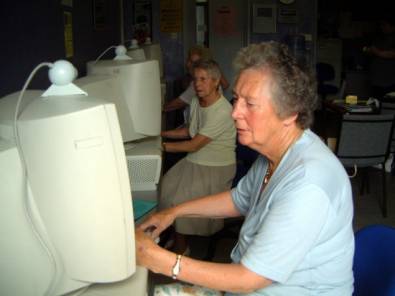|
|

Elderly Surfing the Web More than Ever
San Jose Business Journal
March 25, 2004
The percentage of seniors who go online has jumped by 47 percent between 2000 and 2004, according to a new survey by the nonprofit Pew Internet & American Life Project. It says 22 percent of Americans age 65 or older reported having access to the Internet, up from 15 percent in 2000, which translates to about 8 million Americans age 65 or older who now use the Internet. By contrast, 58 percent of Americans age 50-64, 75 percent of 30-49 year-olds, and 77 percent of 18-29 year-olds currently go online.
Older women have led the charge and the gender ratio among "wired seniors" is now 50/50. The number of seniors who live in households with moderate amounts of income has risen dramatically, as has the number whose education ended with a high school diploma, but the online senior population is still dominated by whites, upper-income household members, and those with college degrees.
"As younger Americans weave the Internet into nearly every aspect of their lives, their parents and grandparents are starting to follow suit, especially when it comes to email and information searches," says Susannah Fox, director of research at the project and author of the report, "Older Americans and the Internet."
The report says:
· 66 percent of wired seniors had looked for health or medical information online at some point in their online life by the end of 2003, a 13-point jump since 2000, and a growth rate of 25 percent.
· 66 percent of wired seniors had done product research online by the end of 2003. That is an 18-point jump since 2000, and a growth rate of 38 percent.
· 47 percent of online seniors had bought something on the Internet by the end of 2003. That is an 11-point increase since 2000 and a growth rate of 31 percent.
· 41 percent have made travel reservations online by the end of 2003. That is a 16-point increase since 2000 and a growth rate of 64 percent.
· 26 percent of wired seniors had looked for religious and spiritual information by the end of 2003. That is a 15-point jump since 2000, or a growth rate of 136 percent.
· 20 percent of online seniors had done banking on the Internet by the end of 2003. That is a 12-point increase since 2000 and a growth rate of 150 percent.
Despite the significant gains among seniors, most Americans age 65 and older live lives far removed from the Internet, know few people who use e-mail or surf the Web, and cannot imagine why they would spend money and time learning how to use a computer, the Pew report notes. Seniors are also more likely than any other age group to be living with some kind of disability, which could hinder their capacity to get to a computer training center or read the small type on many Web sites.
However, there is a burgeoning group of Americans who are slightly younger than retirees and who are vastly more attached to the online world. In fact, older Baby Boomer Internet users (between 50-58 years old) are more like Generation X Internet users (between 28 and 39 years old) than like their older, "Mature" generational neighbors (those between 59 and 68 years old).
The report is based primarily on survey data collected between Feb. 3 and March 1. The Pew Internet & American Life Project is a non-profit, non-partisan research organization, fully funded by the Pew Charitable Trusts to explore the social impact of the Internet.
|
|




